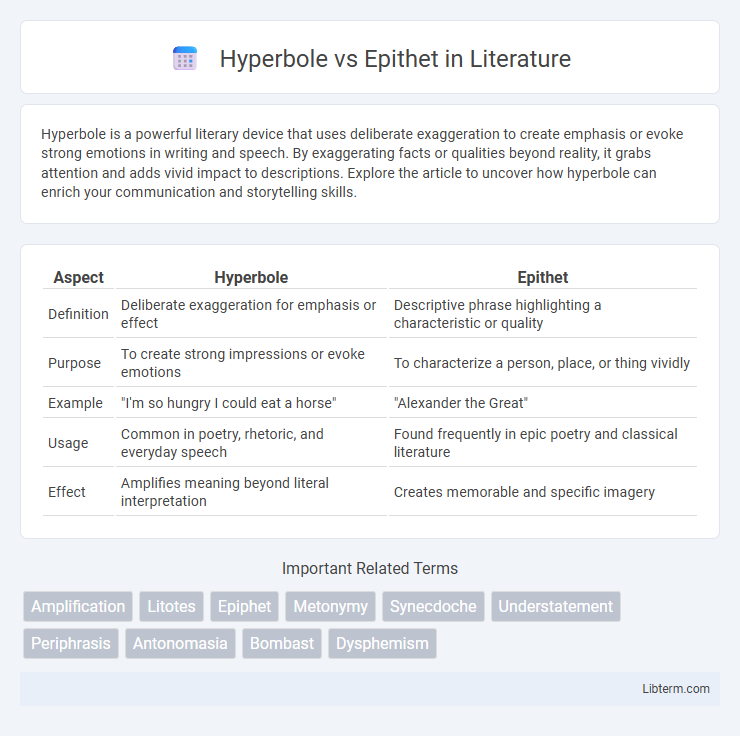Hyperbole is a powerful literary device that uses deliberate exaggeration to create emphasis or evoke strong emotions in writing and speech. By exaggerating facts or qualities beyond reality, it grabs attention and adds vivid impact to descriptions. Explore the article to uncover how hyperbole can enrich your communication and storytelling skills.
Table of Comparison
| Aspect | Hyperbole | Epithet |
|---|---|---|
| Definition | Deliberate exaggeration for emphasis or effect | Descriptive phrase highlighting a characteristic or quality |
| Purpose | To create strong impressions or evoke emotions | To characterize a person, place, or thing vividly |
| Example | "I'm so hungry I could eat a horse" | "Alexander the Great" |
| Usage | Common in poetry, rhetoric, and everyday speech | Found frequently in epic poetry and classical literature |
| Effect | Amplifies meaning beyond literal interpretation | Creates memorable and specific imagery |
Understanding Hyperbole: Definition and Purpose
Hyperbole is a rhetorical device characterized by deliberate exaggeration used to emphasize a point or evoke strong emotions. Its purpose is to create a vivid impression, intensify feelings, or highlight the significance of a concept beyond literal interpretation. Distinct from epithet, which attributes specific qualities or characteristics to a noun, hyperbole enhances expression through overstated language.
Unpacking Epithet: Meaning and Usage
Epithet is a descriptive term or phrase expressing a characteristic quality of the person or thing mentioned, often used to highlight distinctive traits or attributes. Unlike hyperbole, which involves deliberate exaggeration for emphasis, epithets serve as succinct labels that enhance the reader's understanding through vivid, concise description. Common in literature and rhetoric, epithets can function as a stylistic device to convey identity, emotion, or cultural significance efficiently.
Key Differences Between Hyperbole and Epithet
Hyperbole and epithet serve distinct rhetorical purposes: hyperbole involves deliberate exaggeration for emphasis or effect, while epithet assigns a descriptive adjective or phrase that highlights a characteristic attribute of a person or thing. Key differences lie in their function, with hyperbole amplifying reality beyond truth to evoke strong emotions, whereas epithet provides concise, often symbolic identifiers that contribute to imagery or characterization. Understanding these distinctions enhances literary analysis, recognizing hyperbole's role in dramatization and epithet's role in vivid description.
Historical Origins of Hyperbole in Literature
Hyperbole originated in ancient Greek literature, prominently used by Homer in epics such as the Iliad and the Odyssey to evoke strong emotions through exaggerated descriptions. This rhetorical device served as a powerful means to emphasize heroic feats and dramatic events, distinguishing it from epithets that function as descriptive nicknames enhancing character identity. The historical use of hyperbole influenced later literary traditions by embedding exaggerated expressions as a staple of persuasive and vivid storytelling.
Epithet in Classical and Modern Contexts
Epithet, a descriptive term or phrase expressing a characteristic quality, plays a vital role both in classical literature and modern usage by enriching narratives and highlighting traits vividly. In classical contexts, epithets often function as formulaic devices in epic poetry, such as Homer's repeated use of "swift-footed Achilles," aiding oral tradition and characterization. Contemporary literature and media adapt epithets to create memorable identities and emotional resonance, reflecting cultural values and deepening character analysis.
Common Examples of Hyperbole in Everyday Language
Hyperbole often appears in everyday language through exaggerated phrases like "I'm so hungry I could eat a horse" or "I've told you a million times." These expressions emphasize intensity or emotion beyond literal truth, while epithets typically involve descriptive adjectives such as "swift-footed Achilles" or "rosy-fingered dawn," highlighting characteristic traits without exaggeration. Understanding the distinction clarifies how hyperbole amplifies reality, whereas epithets provide figurative characterization.
Notable Epithet Usage in Famous Works
Notable epithet usage in famous works highlights character traits or thematic elements with vivid precision, as seen in Homer's "Iliad," where Achilles is often called "swift-footed" to emphasize his speed and warrior prowess. Shakespeare employs epithets such as "star-crossed lovers" in "Romeo and Juliet" to underscore fate's tragic influence on the protagonists. In contrast to hyperbole, which exaggerates for effect, epithets serve as concise, descriptive labels that enrich narrative identity and symbolism.
Impact on Tone: Hyperbole vs. Epithet
Hyperbole amplifies tone through exaggerated statements that evoke intense emotions or dramatic effect, often creating a sense of urgency or excitement. Epithet refines tone by attributing specific, vivid qualities to characters or objects, enriching the narrative with descriptive depth and emotional nuance. Both devices shape reader perception, with hyperbole intensifying and epithet personalizing the tonal experience.
How Writers Effectively Combine Hyperbole and Epithet
Writers effectively combine hyperbole and epithet by intensifying character traits or emotions to create vivid, memorable imagery. Using hyperbole exaggerates qualities beyond reality, while epithets provide concise, descriptive labels, enhancing the emotional impact and depth of the narrative. This fusion helps convey powerful symbolism, enriches characterization, and engages readers through heightened linguistic creativity.
Mastering Stylistic Devices: Tips for Writers
Mastering stylistic devices like hyperbole and epithet enhances a writer's ability to convey vivid imagery and emotional intensity. Hyperbole employs deliberate exaggeration to emphasize a point or evoke strong feelings, while epithet uses descriptive adjectives or phrases to characterize a noun more vividly. Writers should practice balancing these devices to enrich narrative voice and engage readers without overwhelming the text.
Hyperbole Infographic

 libterm.com
libterm.com